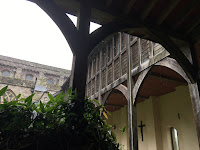 |
| (c) Tony Gillam 2020 |
I arrived in sunshine but, by the following morning, the area was covered in grey cloud and persistent rain. I'd heard that you could get a decent cup of coffee in the cafe at the cathedral - the Refectory, as they call it. So I hovered at the main doorway just as they were opening up and found myself being invited into the great cathedral itself. My wife Sue would have liked it because they didn't charge an 'entry fee', unlike many of the cathedrals in England. It's not that she was a cheapskate - and I know somehow the upkeep of the buildings has to be paid for - but Sue and I always agreed it just seems wrong for a church to insist on people paying to enter.
 |
| (c) Tony Gillam 2020 |
Being drawn into the cathedral on a rainy September morning I found myself rather caught off-guard. Of course, cathedrals are designed to be awe-inspiring so I shouldn't have been surprised to have suddenly felt so moved by the experience but, of course, so soon after Sue's death, I felt completely overwhelmed. I stopped to light a votive candle - not something I would normally do, but something Sue liked to do whenever we visited a church. She'd do it to remember her dad and perhaps other loved ones we'd lost. So I lit a candle for Sue and then, under the huge vaulted ceiling, before the alter and the tomb of St David, I became unexpectedly tearful. I continued to wander through the cathedral trying not to let anyone see I was upset.
I came upon a little display giving information on local bereavement support groups which made me think perhaps it was common for grieving people to get upset in the cathedral. And then there was a small exhibition in a section called The Treasury explaining the history of the building and how it dates from the 12th century, though there's been a church on this site since the 6th century. The exhibition told how Henry VIII created the Church of England and the Church of Wales, how Cromwell had destroyed many of its treasures and how the Victorians had begun to restore the cathedral.
 |
| (c) Tony Gillam 2020 |
I continued on to a covered walkway which finally led me to The Refectory but I still had to wait ten minutes before it opened. Waiting on a bench in the covered walkway, watching the Welsh rain teem down, reminded me of the scene in Brother Sun, Sister Moon when St Francis and his band of brothers are going from house to house in Assisi, asking for alms in the rain.
 |
| (c) Tony Gillam 2020 |
Finally I was allowed into the refectory but had to wait five minutes more while the coffee machine heated up. In the fullness of time, I was rewarded with an excellent Americano. In the cosy cafe, I drank my coffee and pulled from my backpack a copy of New Humanist magazine that I'd brought with me. I'm not a humanist - at least, I don't think of myself as one, but perhaps I am. I'd bought this magazine simply because it had some interesting articles in it - a feature on the myth of the self, and a quirky piece about how Turkey passed a law in 1925 banning the wearing of the fez. There were a couple of items about blasphemy. While I'd been in lockdown and in full-time carer mode, back in April, it seems a prominent Nigerian humanist called Mubarak Bala had been arrested on charges of blasphemy. In the same month, I read, blasphemy had been decriminalised in Scotland. Apparently, Northern Ireland still has an active blasphemy law whereas the Republic of Ireland decriminalised it in 2018, and England and Wales in 2008. Lucky for me that blasphemy was no longer illegal in Wales, I reflected, as I flicked through my copy of New Humanist in the refectory of this centuries old seat of Christianity where, for the past 1,500 years, prayer and worship have taken place. At least I wasn't wearing a fez.